Looking for the perfect tool to kickstart your ecommerce journey? Or thinking about switching from WooCommerce to something more reliable, agile, and scalable? In this blog, we’ll explore several WooCommerce alternatives and which features to consider, helping you turn confusion into confidence.
Join us as we explore the best WooCommerce alternatives to find the perfect one to fit your business!
Why Look for a WooCommerce Alternative?
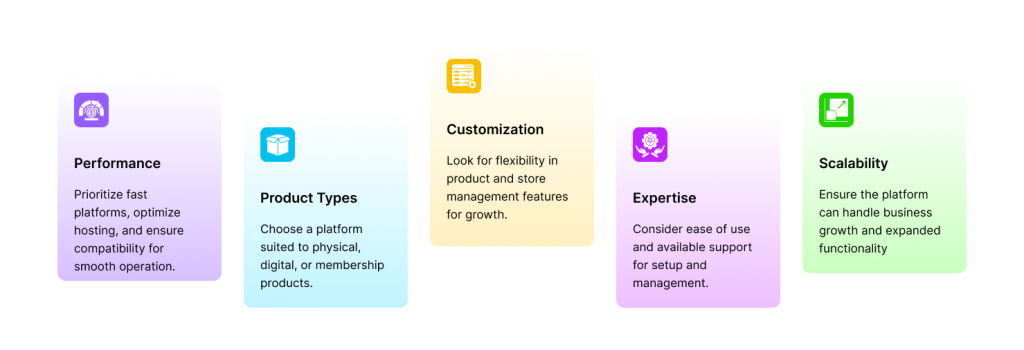
Before exploring the WooCommerce alternatives, start by understanding why you’re looking to switch, and identify the main features your business requires within the new platform.
While not all alternatives can surpass WooCommerce in every area, some may be a better fit depending on your specific requirements.
Performance Efficiency
A common complaint from WooCommerce users is that the website can become slow after a while. This is often due to additional plugins, poorly developed themes, lack of optimization, or slow hosting.
When selecting an alternative, prioritize platforms known for speed and performance. Here’s how you can ensure this –
- Self Hosting: Platforms that include hosting plans are generally faster than others. However, if you choose a self-hosted platform, be prepared for the technical details to ensure efficient hosting performance.
- Compatibility: The chosen platform should be compatible with various devices, operating systems, themes, and plugins to ensure seamless performance across all environments.
Product Types
Not all WooCommerce alternatives are suited for the same types of products. While some may focus on physical goods, others could focus on selling memberships, subscriptions, software licenses, or digital music.
It’s important to understand your specific needs and choose a platform that offers distinct advantages for your product type.
- Physical Products: Home Appliances, Clothing and Accessories, Health and Beauty, Electronics, Fitness Equipment, Pet Supplies, Kitchenware, etc.
- Digital Products: eBooks, Online Courses, Digital Art Downloads, Music Tracks or Albums, Graphic Design Templates, Stock Photos, Software Tools, etc.
- Memberships: Online Learning Platform Membership, Subscription Box Service, OTT Content Access, SaaS Membership, Book Club Membership, Music Streaming Service, etc.
Customization Availability
For online businesses, constant experimentation, changes, feature additions, and upgrades are essential. So, your chosen platform should meet these demands.
It should come with a solid set of default features and offer additional options for enhancements as needed. Focus customization options include –
- Product Management: Product Listing, Bulk Upload/Editing, Product Categorization, Price Management, Product Variants, SKU Management, Custom Attributes, and Order History Tracking.
- Store Management: Store Configuration, User Role Management, Payment Gateway Integration, Shipping Options, Tax Settings, Order Management, Analytics and Reporting, Multi-Channel Selling, Marketing tools, etc.
Required Expertise

When choosing an alternative to WooCommerce, consider the level of technical expertise required to set up and manage the platform.
Some platforms may offer user-friendly interfaces that cater to beginners, while others might require advanced technical skills for customization and maintenance.
- User-friendly Interfaces: The platform should be equipped with a user-friendly interface and beginner-friendly usability.
- Support and Documentation: A comprehensive documentation and support system is essential for installing, using, and troubleshooting the platform independently.
Scalability Potential
As your sales start booming or your product listing expands, your chosen WooCommerce alternative should be able to cope with the growth without sacrificing performance. It’s crucial to select a platform that can grow alongside your business.
Look for platforms that offer scalability features, such as the ability to add unlimited products, manage increased traffic, and integrate additional functionalities easily.
WooCommerce Alternatives: Comparison Table
| Platform | Product Type | Hosting | Customization | Ease of Use | Scalability | Pricing |
| WooCommerce | Physical/Digital | Self-hosted | High | Moderate | High | Free (addons cost) |
| EasyCommerce | Physical/Digital | Self-hosted | High | Very Easy | Very High | Free (addons cost) |
| Ecwid | Physical | Hosted | Limited | Easy | Moderate | $0-$105/mo |
| WP EasyCart | Physical/Digital | Self-hosted | Moderate | Easy | Limited | $69/year |
| EDD | Digital | Self-hosted | Moderate | Easy | High | $99.50/year |
| MemberPress | Membership | Self-hosted | Limited | Moderate | Moderate | $179/year |
| Shopify | Physical/Digital | Hosted | High | Easy | High | $19-$299/mo |
| BigCommerce | Physical/Digital | Hosted | Moderate | Easy | High | $29+/mo |
| PrestaShop | Physical/Virtual | Self-hosted | High | Difficult | High | Free (addons cost) |
8 Best WooCommerce Alternatives
This section explores a list of the top eight alternatives to WooCommerce. Each product has been carefully selected based on its suitability for various product types and other criteria mentioned above, among other factors.
Alternatives Within WordPress
1. EasyCommerce
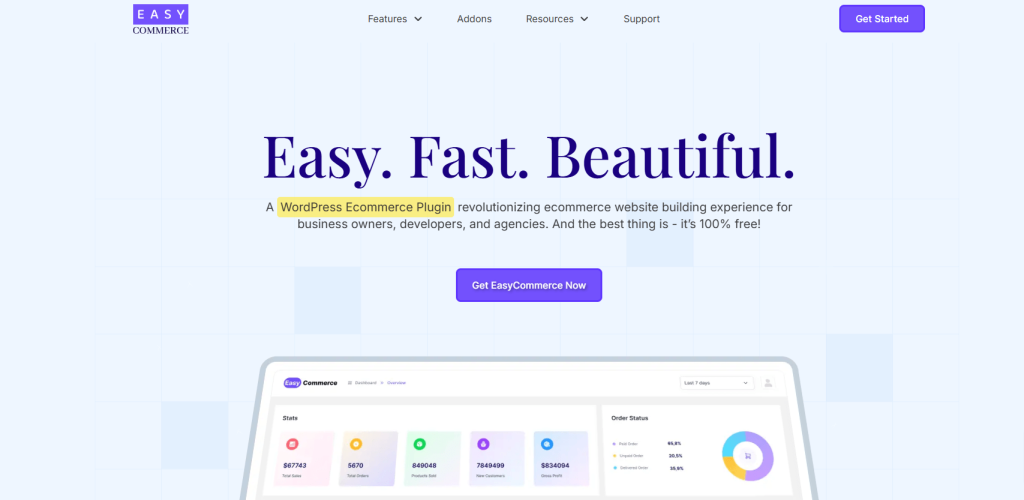
Best for: Physical Products & Digital Downloads
EasyCommerce is developed as an all-in-one plugin that combats all the struggles of WooCommerce. With a streamlined interface, even the novice entrepreneur can get a store up and running in minutes.
And if you want real-time insights on your business, just head over to the EasyCommerce dashboard for all the numbers you need to make data-driven decisions. Unlike WooCommerce, adding products to your catalog, updating prices, and managing inventory is just a matter of a few clicks.
Also, EasyCommerce doesn’t rely on a range of plugins to manage essential functions. It has all the features built-in you can avoid unnecessary bloat on your store and keep it running at top speed, even as your store grows.
Major Advantages of EasyCommerce
- Multiple Payment Integrations: Offer popular payment options like PayPal, Square, Mollie, Stripe, Braintree and more.
- Highly Scalable: Add unlimited products, and grow your store without slowing down your website.
- Easy Setup Process: Setting up your store is simple with easy-to-follow steps built for users of all skill levels.
Major Disadvantages of EasyCommerce
- Limited Addons: Dedicated addons are limited, as it’s still a relatively new product.
Pricing
Free to install and use, but addons and hosting may incur additional costs.
2. Ecwid Ecommerce Shopping Cart

Best for: Physical Products
Ecwid stands out as an ecommerce solution that integrates effortlessly with multiple platforms, including WordPress. Its multi-channel capabilities let you sell simultaneously across websites, social media, and online marketplaces like Amazon and eBay. This all-in-one approach helps businesses reach a broader audience from one centralized platform.
Also, Ecwid for WordPress offers a mobile app (Pro) that lets you manage your store, orders, and shipping on the go.
This frees up valuable time for you to work on business strategies instead of spending long hours in front of your computer.
Major Advantages of Ecwid
- Instant Integration: You can add Ecwid to any existing website without needing to build a new store from scratch.
- Multilingual Storefront: Easily translate your store into different languages to serve international customers seamlessly.
- POS Integration(Pro): Offers built-in point-of-sale features, syncing online and offline sales in real time.
- Unlimited Product Listing(Pro): Ecwid stores its data on its own servers, eliminating any storage concerns for your self-hosted WordPress site.
Major Disadvantages of Ecwid
- Customization Limits: Less flexibility for heavily customized designs compared to WooCommerce.
- Limited Free Plan: The free plan restricts advanced features like inventory tracking and multi-channel selling.
Pricing
Free plan available for up to 10-page block functions. Unlocking additional features requires paid plans like Venture at $25/month, Business at $45/month, and Unlimited at $105/month.
If you want an Ecwid alternative that works outside of WordPress, there are various options that matches the speed and capabilities of Ecwid ecommerce shopping cart.
3. WP EasyCart
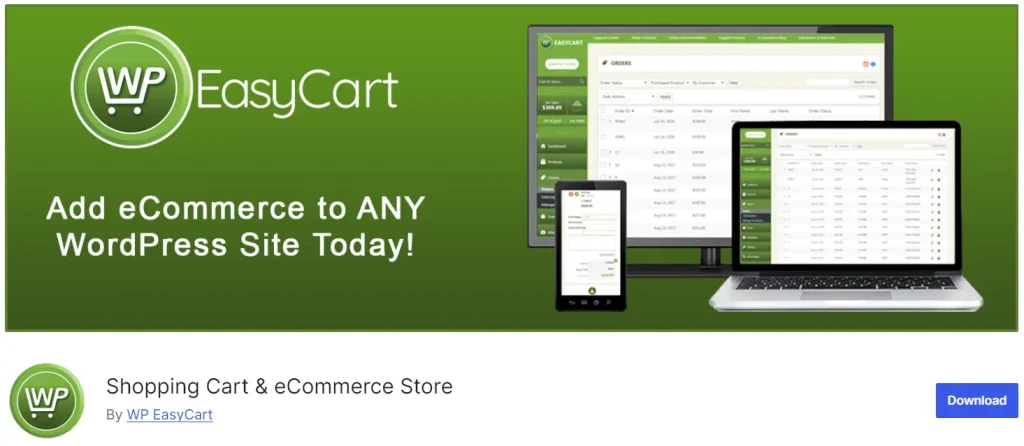
Best for: Physical/Digital Products
WP EasyCart provides small businesses with a seamless ecommerce solution. This versatile platform supports housing both physical products and digital files (music, images, software, etc.) or subscription-based services. It’s easy to set up and allows users to quickly launch their online stores without hassle.
This business solution tool comes with powerful automation features, including a tax calculator based on shipping location. Easy integrations with shipping platforms like USPS, UPS, FedEx, DHL, and more make it a top choice for small to medium-level online businesses looking for simplified logistics management.
Major Advantages of EasyCart
- Packaging and Shipping: Print sales receipts & packaging slips, add shipping notes, and email customers from one easy location.
- Integration with QuickBooks: Simplifies accounting by syncing sales data directly with QuickBooks.
- Extensive Payment Gateways: Default gateways like PayPal, Stripe, Square, and 30+ additional payment gateways cater to users from various locations.
Major Disadvantages of EasyCart
- Basic Customization: While flexible for product types; design and theme options are more limited compared to WooCommerce.
- Not for All: Enterprise-level users will find WP EasyCart unable to match their large-scale business operations.
- Additional Fees: The free version comes with an additional application fee.
Pricing
This is a Fremium plugin. The paid version starts at $69/year, with added features like subscriptions, live shipping rates, and promotional tools.
4. Easy Digital Downloads
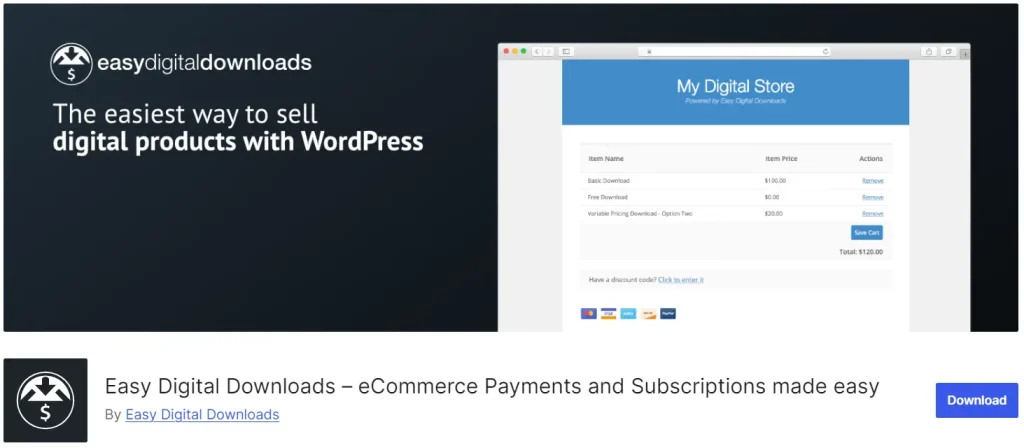
Best for: Digital Products
Unlike WooCommerce, which primarily caters to physical products, Easy Digital Downloads (EDD) is designed exclusively for selling digital goods.
It’s popular among digital creators looking to sell eBooks, software, digital art, and music online. EDD ensures a secure and transparent platform, providing a safe environment for both creators and consumers to buy and sell their digital interests.
Another strength of EDD is its robust control over digital assets. Sellers can monitor product downloads, limit access to files, and easily manage license renewals for software. These diverse benefits have attracted over 50,000 active users to EDD, and the number continues to grow.
Major Advantages of EDD
- Content Security: Secure content management empowers users to confidently sell their intellectual creations.
- Recurring Payments Add-On: This feature helps users sell subscription licenses or any other digital products that require follow-on payments.
- Detailed Reporting: A comprehensive report consisting of sales, revenues, products, categories, etc makes business management easier.
- Customer Management: Tracks detailed customer purchase history and allows for easy refunds, ensuring better post-sale engagement.
Major Disadvantage of EDD
- Dependency on Extensions: While the core plugin is free, many advanced features require paid add-ons, which can increase overall costs.
Pricing
Free to install and use. Paid plans start at $99.5/year, including features for subscription payments and email marketing integrations. You can access all the premium features by paying just $499.50/ year.
5. MemberPress
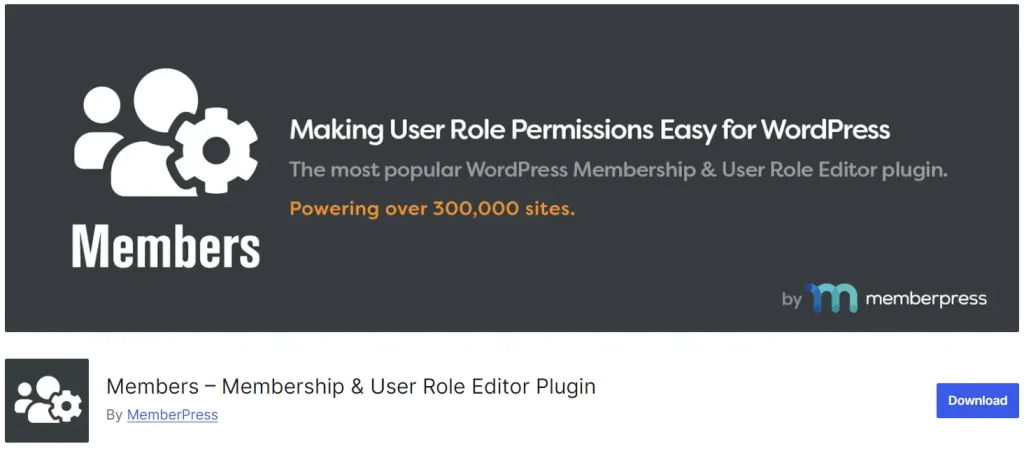
Best for: Membership Product
MemberPress is the top choice for monetizing content through memberships and subscriptions. It transforms a standard WordPress site into a powerful membership platform with advanced user role management.
With this setup, you can easily build a fully functional membership or subscription-based website with minimal effort. What truly sets MemberPress apart, however, is its ability to create a detailed role hierarchy, where each user type has clearly defined permissions.
This allows content creators to upload, edit, and manage their work securely, ensuring it’s protected from unauthorized access while remaining open to the intended audience.
Major Advantages of EDD
- Advanced Content Restriction: Allows for precise content control, restricting pages, posts, or custom sections based on membership tiers.
- Automated Billing & Recurring Payments: Automates membership renewals and billing, reducing manual work and improving user retention.
- Built-In Course Builder: Create, sell, and manage online courses directly within MemberPress.
- Content Dripping: Let you schedule content for timed releases and access expiration to keep the audiences’ excitement alive.
Major Disadvantages of EDD
- Not Integrable Friendly: MemberPress is integrable with EDD, GiveWP, Meta Box, etc. plugins but not enough compared to WooCommerce.
- Complex Setup for Beginners: Setting up complex membership tiers or content restrictions can be challenging for new users.
Pricing
The basic plan starts at $179/year, which includes core membership features. Higher-tier plans offer additional integrations and advanced support.
Alternatives Outside of WordPress
6. Shopify

Best for: Physical and Digital Products
Outside the WordPress ecosystem, Shopify is a top contestant for WooCommerce alternatives for its powerful features and widespread popularity. Being a cloud-based ecommerce solution, it takes care of hosting for you and offers easy scalability without concerns about storage limits.
Shopify has a huge ecosystem of apps with over 800+ extensions, and integration solutions. This means you are never short of customization options to showcase, market, and sell your products effectively.
With a high conversion rate, Shopify remains a top choice for both small to medium-sized businesses and enterprise-level entrepreneurs. One downside is that beginners may find Shopify challenging to master initially because of its learning curve.
Major Advantages of Shopify
- Built-in Multichannel Selling: Easily sell across social media platforms and marketplaces, while accessing all the unified data from one dashboard.
- Global Payment Options: Shopify supports over 100 payment gateways, making it easier for international businesses to cater to diverse customers.
- 24/7 Support: Round-the-clock customer service is available via chat, email, and phone, helping to resolve issues fast.
Major Disadvantages of Shopify
- Transaction Fees: Shopify charges extra transaction fees if you don’t use Shopify Payments, which can add up over time.
- Not Free: There is no free version of Shopify; nearly every aspect, from installation to using apps, requires separate payments.
Price
This is a premium plugin. Paid plans start from $19/month for solo entrepreneurs. Other plans include $49/month for the team, $299 for advanced users, and $2300 for more complex businesses.
Check out our blog on WordPress vs Shopify to get a more detailed comparison of the two platforms.
7. BigCommerce

Best for: Physical and Digital Products
As its name suggests, BigCommerce is an ecommerce platform specifically built to manage large product catalogs and high sales volumes.
Like Shopify, it is a fully hosted solution that comes with essential tools integrated into the core platform based on your chosen plan. BigCommerce enhances user convenience with its intuitive interface, making it easy to list and sell products effectively.
BigCommerce excels at creating both B2B and B2C websites, equipped with impressive features. It’s also one of the most SEO-friendly platforms available, providing advanced tools that help your store rank higher in SERP.
Major Advantages of BigCommerce
- Customizable Product Options: Offers flexible product variants, making it suitable for stores with diverse inventories and complex product offerings.
- Scalability: Handles high-volume sales without affecting the speed or performance of your store.
- Abandoned Cart Saver: Recover lost sales by automatically sending emails to customers who leave items in their carts.
Major Disadvantages of BigCommerce
- Annual Sales Limits: Each pricing plan has a revenue range, and crossing it will require upgrading to a more expensive plan.
- Added Transaction Costs: Transaction fees can go up to 2.35%+ a fixed 49 cents per sale depending on the payment gateway in use.
Pricing
The 15-day trial period comes free. After that plans start at $29/month when billed annually. BigCommerce Enterprise is custom-priced based on business needs.
8. PrestaShop
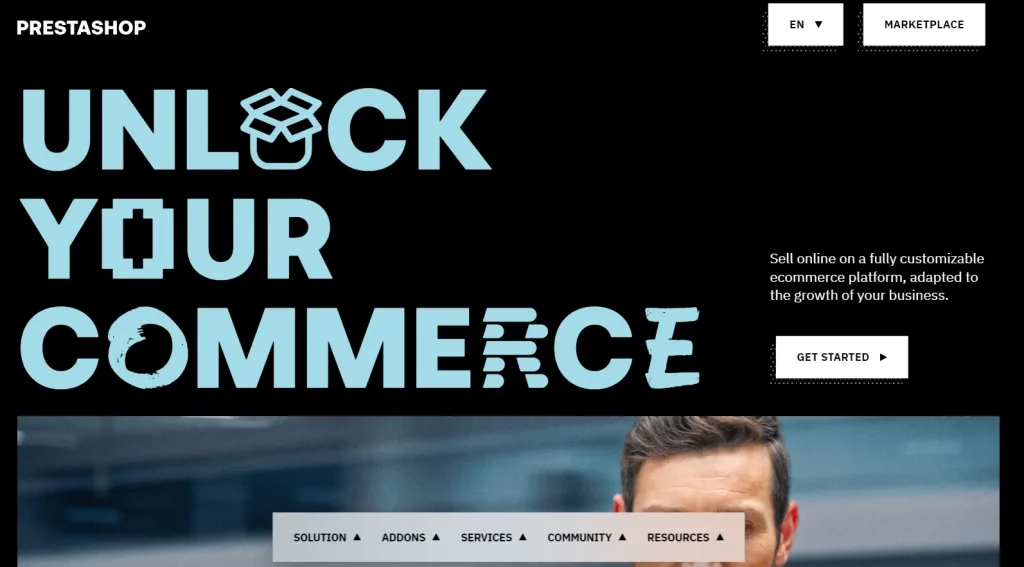
Best for: Physical and Virtual Products
Like WordPress, PrestaShop is an open-source CMS platform, which allows for customization to meet your specific needs with the right expertise.
It serves as a standalone core platform designed exclusively for ecommerce websites, which means you can expect a seamless experience without compatibility issues between plugins.
PrestaShop features an easy-to-use interface, streamlined product page creation, and organized navigation. It also has a dedicated marketplace for add-ons, allowing you to expand your capabilities as your business grows and enhance your ecommerce game.
Major Advantages of PrestaShop
- Multi-Language and Currency Support: 75+ languages and 50+ currency support make it suitable for international trade.
- No Monthly Fees: Since it’s open-source, you won’t be tied to recurring monthly charges for the platform itself.
- Detailed Documentation: A complete list of support documentation and a 1 million+ strong user base to help you sort out any issues.
- Advanced Management: Order management, inventory management, shipping, and tax management simplify the process for users.
Major Disadvantages of PrestaShop
- Requires Technical Knowledge: Often requires coding knowledge to customize or maintain, which can be a barrier for non-technical users.
- Paid Add-Ons: Many essential features require paid modules, which can increase the costs dramatically.
Pricing
The classic version is free to download and use with paid modules and hosting costs applied. The hosted plan starts from €29/month with official hosting and support.
Enterprise packages with the most advanced features are subject to a custom quote.
You Might Also Like
Final Verdict
Starting an ecommerce business with WooCommerce is simple, but its downsides including slow performance, plugin reliance, and compatibility issues can be frustrating sometimes. Why struggle when easier alternatives are available?
Explore our list of WooCommerce alternatives, compare them, and choose the one that best fits your needs. A website tailored to your vision is the first step to finding ecommerce success!
Frequently Asked Questions (FAQs)
1. Is there a better option than WooCommerce?
Absolutely! There is always something better and in the digital world, it’s even more applicable.
WordPress-based platforms such as EasyCommerce, Ecwid for WordPress, EDD as well as non-WordPress-based Shopify, and BigCommerce top WooCommerce in many criteria.
Read our full blog to go into detail.
2. Does WooCommerce slow down your website?
WooCommerce can slow down your website, as it often requires multiple third-party plugins to meet specific needs.
Not all plugins are built equally, and web hosting services vary in quality. When these factors are combined, WooCommerce sites can experience significant performance issues.
3. Are there any free Woocommerce alternatives?
There are several free alternatives to WooCommerce, including EasyCommerce, Ecwid Shop Cart, Easy Digital Downloads, and PrestaShop.
While these platforms offer free versions, keep in mind that additional costs like hosting, add-ons, and premium themes may still apply.

